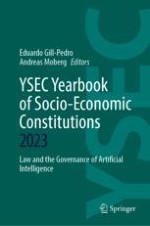2024 | OriginalPaper | Buchkapitel
Trustworthy Artificial Intelligence and Public Procurement
verfasst von : Isabel Gallego Córcoles
Erschienen in: YSEC Yearbook of Socio-Economic Constitutions 2023
Verlag: Springer Nature Switzerland
Aktivieren Sie unsere intelligente Suche, um passende Fachinhalte oder Patente zu finden.
Wählen Sie Textabschnitte aus um mit Künstlicher Intelligenz passenden Patente zu finden. powered by
Markieren Sie Textabschnitte, um KI-gestützt weitere passende Inhalte zu finden. powered by
